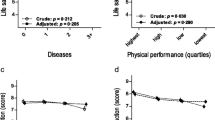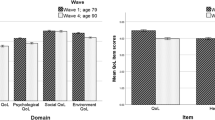Abstract
Background and aims: It is often assumed that aging is accompanied by diverse and constant functional and cognitive decline, and it is therefore surprising that the well-being of older persons does not appear to decline in the same way. This study investigates longitudinally whether well-being in older persons changes due to Persistent Deterioration of Functioning (PDF). Methods: Data were collected in the context of the Longitudinal Aging Study Amsterdam (LASA). Conditions of PDF are persistent decline in cognitive functioning, physical functioning and increase in chronic diseases. Measurements of well-being included life satisfaction, positive affect, and valuation of life. T-tests were used to analyse mean difference scores for well-being, and univariate and multivariate regression analyses were performed to examine changes in three well-being outcomes in relation to PDF. Results: Cross-sectional analyses showed significant differences and associations between the two PDF subgroups and non-PDF for well-being at T3. In longitudinal analyses, we found significant decreases in and associations with well-being over time in respondents fulfilling one PDF condition (mild PDF). For respondents fulfilling two or more PDF conditions (severe PDF), longitudinally no significant associations were found. Conclusions: Cognitive aspects of well-being (life satisfaction and valuation of life) and the affective element (positive affect) of well-being appear to be influenced negatively by mild PDF, whereas well-being does not seem to be diminished in persons with more severe PDF. This may be due to the ability to accept finally the inevitable situation of severe PDF.
Similar content being viewed by others
References
Baltes PB. The process of successful aging. Aging Soc 1996; 16: 397–422.
Lawton MP, Moss C, Hoffman C, Kleban M, Ruckdeschel K, Winter L. Valuation of Life: a concept and a scale. J Aging Health 2001; 13: 3–31.
Westerhof GJ, Dittmann-Kohli F, Bode C. The aging paradox: towards personal meaning in gerontological theory. In Biggs S, Lowestein A, Hendricks J, eds. The need for theory: sociology for the 21st century. Amityville: Baywood, 2003.
Albrecht GL, Devlieger PJ. The disability paradox: high quality of life against all odds. Soc Sci Med 1999; 48: 977–88.
Isaacowitz DM. Positive and negative affect in very old age. J Gerontol B Psychol Sci Soc Sci 2003; 58: 143–52.
Gatz M, Zarit SH. A good old age: paradox or possibility. In Bengtson VL, ed. Handbook of Theories of Aging. Springer Publishing Company, 1999.
Faber von MA. Successful aging in the oldest old. Arch Intern Med 2001; 161: 2694–700.
Rowe JK, Kahn RL. Human Aging: usual and successful. Science 1987; 237: 143–9.
Laslett P. A fresh map of life. The emergence of the Third Age. Cambridge: Harvard University Press, 1991.
Crimmins E, Hayward M, Saito Y. Differentials in active life expectancy in the older population of the United States. J Gerontol Soc Sci 1996; 51B: S111–20.
Baltes PB, Smith J. Multilevel and systemic analyses of old age: theoretical and empirical evidence for a fourth age. In Bengtson VL, ed. Handbook of theories of aging. Springer Publishing Company, 1999: 153–73.
Schroots JJ, Yates FE. On the dynamics of development and aging. In Bengtson VL, ed. Handbook of theories of aging. Springer Publishing Company 1999: 417–33.
Diener E, Suh EM, Lucas RE, Smith HL. Subjective well-being: three decades of progres. Psychol Bull 1999: 125: 276–302.
Mroczek DK. Change in life satisfaction during adulthood: findings from the Veterans Affairs Normative Aging Study. J Pers Soc Psychol 2005; 88: 189–202.
Kunzmann U, Little TD, Smith J. Is age-related stability of subjective well-being a paradox? Cross-sectional and longitudinal evidence from the Berlin Aging Study. Psychol Aging 2000; 15: 511–26.
Rott C, Jopp D, d’Heureuse V, Becker G. Predictors of well-being in very old age. In Wahl HW, ed. The many faces of health, competence and well-being in old age. Springer Publishing Company, 2006: 119–29.
Mroczek DK, Kolarz CM. The effect of age on positive and negative affect: a developmental perspective on happiness. J Pers Soc Psychol 1998; 75: 1333–49.
Jorm AF, Christensen H, Scott Henderson A, Jacomb PA, Korten AE, Mackinnon A. Factors associated with successful aging. Aust J Aging 1998; 17: 33–7.
Newman AB, Arnold AM, Naydeck BL, et al. Successful aging. Effect of subclinical cardiovascular disease. Arch Intern Med 2003; 163: 2315–22.
Deeg DJ, van Tilburg T, Smit JH, de Leeuw ED. Attrition in the Longitudinal Aging Study Amsterdam. The effect of differential inclusion in side studies. J Clin Epidemiol 2002; 55: 319–28.
Knipscheer CPM, de Jong Gierveld J, van Tilburg TG, Dykstra PA (eds). Living arrangements and social networks of older adults. Amsterdam: VU University Press, 1995.
Diener E. Subjective well-being. Psychol Bull 1984; 95: 542–75.
Hoff S. And they lived happily ever after. Constructing a measurement instrument on well-being among the elderly by means of facet design. Dissertation Vrije Universiteit Amsterdam, 1995.
Radloff LS. The CES-D scale: a self report depression scale for research in the general population. Appl Psychol Meas 1977; 1: 385–401.
Ranzijn R, Luszcz M. Measurement of subjective quality of life of elders. Int J Aging Hum Dev 2000; 50: 263–78.
Deeg DJH. Health and quality of life. In Mollenkopf H, Walker A, eds. Quality of Life in Old Age. International and Multidisciplinary Perspectives. Heidelberg: Springer Verlag, 2007: 195–213.
Lawton MP, Moss M, Hoffman C, Grant R, Ten Have T, Kleban MH. Health valuation of life, and the wish to live. Gerontologist 1999; 39: 406–16.
Folstein MF, Folstein SE, Mc Hugh PR. Mini Mental State: a practical method for grading the cognitive state of patients for the clinic. J Psychiatr Res 1975; 12: 189–98.
Kempen G, Brilman E, Ormel J. Mini-Mental State Examination. Normative data and a comparison of a 12-item and a 20-item version in a sample of community-based elders. TGG 1995: 26: 163–172 (in Dutch).
Sonsbeek van JL. Methodological and substantial aspects of the OECD indicator of chronic functional limitations. Maandbericht Gezondheid (CBS) 1988; 88: 4–17.
Central Bureau of Statistics. Health Interview Questionnaire. Heerlen: the Netherlands, 1989.
Kriegsman DM, Penninx BW, Van Eijk JT, Boeke AJ, Deeg DJ. Self-reports and general practitioner information on the presence of chronic diseases in community dwelling elderly. A study on the accuracy of patients self-report and on determinants of inaccuracy. J Clin Epidemiol 1996; 49: 1407–17.
Ryff CD. Possible selves in adulthood and old age: a tale of shifting horizons. Psychol Aging 1991; 6: 286–95.
Ryff CD. Happiness is everything, or is it? Explorations on the meaning of psychological well-being. J Pers Soc Psychol 1989; 57: 1069–81.
Borg C, Hallberg IR, Blomqvist K. Life satisfaction among older persons (65+) with reduced self-care capacity: the relationship to social, health and financial aspects. J Clin Nurs 2006; 15: 607–18.
Kempen G, Ormel J. Daily functioning of older persons. Van Gorcum, Assen: Dissertation Vrije Universiteit Amsterdam, 1996 (in Dutch).
Landau R, Litwin H. Subjective well-being among the old-old: the role of health, personality and social support. Int J Aging Hum Dev 2001; 52: 265–80.
Campbell A. Converse PE. Rodgers WL. The Quality of American Life. Perceptions, Evaluations and Satisfactions. New York: Russell Sage Foundation, 1976.
Ranzijn R, Luszcz M. Acceptance: A key to well-being in older adults. Aust Psychol 1999; 34: 94–8.
Butler, Ciarrochi J. Psychological acceptance and quality of life in the elderly. Quality Life Res 2007; 16: 607–15.
Smith J, Borchelt M, Maier H, Jopp D. Health and Well-being in the young old and oldest old. J Soc Issues 2002; 58: 715–32.
Author information
Authors and Affiliations
Corresponding author
Rights and permissions
About this article
Cite this article
Jonker, A.A.G.C., Comijs, H.C., Knipscheer, K.C.P.M. et al. Persistent Deterioration of Functioning (PDF) and change in well-being in older persons. Aging Clin Exp Res 20, 461–468 (2008). https://doi.org/10.1007/BF03325153
Received:
Accepted:
Published:
Issue Date:
DOI: https://doi.org/10.1007/BF03325153




